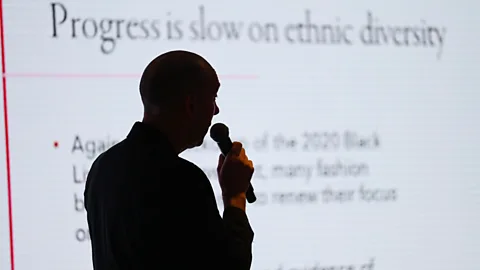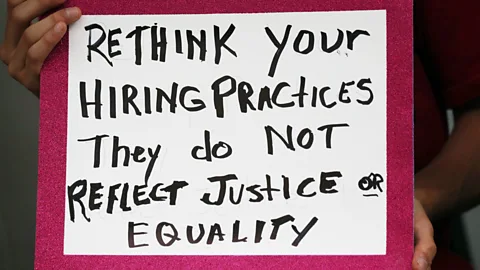DEI is a lightning rod for controversy – but the practice isn't dead
 Getty Images
Getty ImagesDiversity, equity and inclusion programmes picked up in the past few years. They've brought US companies positive results – but are increasingly caught in the crossfire.
In the US, as diversity, equity and inclusion initiatives have mainstreamed, so has criticism around them. The letters 'DEI' themselves – let alone the programmes to implement these principles – have increasingly stirred controversy among high-profile leaders, who've taken aim at the concept across both the public and private sectors. Among the loudest opposing voices are hedge-fund manager Bill Ackman and Elon Musk – both billionaires with large social media followings – who launched their attacks beginning late 2023.
DEI is a set of principles designed to make people of various backgrounds – including socio-economic class, race, gender and physical ability – feel ed, welcomed and safe. In a business context, it's meant to set up marginalised workers for the same success as their peers. These programmes are an integral part of many businesses' core strategies, yet the mere mention of them has pitted politicians and powerful executives against proponents of DEI policies and the leaders who implement them.
Companies have implemented advancement programmes for minority workers for decades, but the term 'DEI' mainstreamed following the 2020 murders of George Floyd, Ahmaud Arbery and Breonna Taylor. In response to public pressure for corporate social ability in the wake of the Black Lives Matter movement, many firms including Google, Nike and Wells Fargo began appointing chief diversity officers to oversee their newly minted – and widely publicised – DEI efforts.
Beyond a show of solidarity, these DEI programmes proved to be a boon for positive publicity and resulted in the creation of jobs: in 2021, the first year after the Black Lives Matter protests, companies listed on the S&P 100 added more than 300,000 jobs – 94% of which went to people of colour. The initiatives were also successful for business itself: in 2022, McKinsey & Company reported that companies with robust DEI programmes were better able to respond to challenges, win top talent and meet the needs of different customer bases.
Now, many workers and employers alike have been left wondering why these largely successful programmes are attracting so much backlash – and whether their days are numbered.
 Alamy
AlamyA deep-rooted history
Although the visibility of DEI initiatives reached fever pitch in the past years, the concept of equal opportunity in the workplace isn't new. Lily Zheng, DEI strategist, consultant and author of DEI Deconstructed: Your No-Nonsense Guide to Doing the Work and Doing It Right, traces the emergence of the term back to the creation of the Equal Employment Opportunity Commission (EEOC) in 1965. The EEOC enabled individuals to report companies engaging in workplace discrimination on the basis of gender, race, age, pregnancy and more.
Zheng says growing awareness of discrimination in the workplace – and the increasing threat of legal action – led many businesses and institutions to incorporate policies that centred the rights and advancement of minority and marginalised groups. Zheng dates the adoption and widespread use of the 'diversity', 'equity' and 'inclusion' to roughly between the 1990s and early 2020s.
More like this:
DEI boosts the bottom line for many companies, according to both experts and data. Research shows major firms with women and people of colour at the helm outperform their homogenous peers. A 2020 McKinsey & Company analysis of 1,000 US firms showed companies with more gender diversity within their leadership teams were 25% more likely to have higher profits than their peers who did not. The report also showed companies with the most ethnic and cultural diversity achieved 36% higher profitability than companies with a less diverse C-suite.
As businesses rapidly globalise, DEI is becoming even more important for many firms. US companies that manufacture in America might, for example, have engineers working in Asia, which means employees who can work cross-culturally will be an asset, says Michele Williams, associate professor at the University of Iowa's Tippie College of Business.
And domestically, as the population of the US continues to rapidly diversify, the demographics of American workplaces will change as well, says Gisele Marcus, professor of practice in diversity, equity and inclusion at Washington University in St Louis. Companies that actively engage a diverse pool of talent now will be the most nimble in the future, she says.
Echoes of the past
Amid the past three years of widespread layoffs, DEI programmes and the professionals who led them took a blow. Looking for cost savings, many companies dismantled DEI-focused initiatives, and in some cases, eliminated entire departments responsible for the advancement of marginalised workers. Many of the employees who found themselves in the crosshairs were workers of colour, particularly women.
Cuts proliferate. After reaching their peak in early 2023, DEI positions dipped 5% by the end of last year, according to a Revelio Labs analysis shared with The Washington Post. Despite a hiring spree, companies have either shed or struggled to retain their chief diversity officers.
 Getty Images
Getty ImagesSome people and firms are now fatigued following George Floyd's death, the "guilt" brought by America's racial dialogue and the subsequent surge in DEI interest, says Malia Lazu, a lecturer at MIT Sloan School of Management and author of From Intention to Impact: A Practical Guide to Diversity, Equity, and Inclusion. Firms that rushed to make reactionary public commitments about their DEI goals were not equipped to properly execute them, she adds.
Businesses have offered their own reasons for cutting back on DEI. Marcus says companies are minimising their DEI efforts in response to claims such programmes give marginalised groups preferential treatment. Many firms are worried about finding themselves as the targets of anti-DEI litigation, which is becoming increasingly common as the voices of detractors are amplified in the larger cultural conversation. Because of that threat of public scrutiny, "people are nervous", says Marcus – even though typical DEI initiatives have most likely been reviewed for their legality.
These concerns may be warranted. In August 2023, the Fearless Fund, an Atlanta-based venture capital firm that s underfunded start-ups founded by black women, was sued by the American Alliance for Equal Rights, an organisation that challenges "distinctions and preferences made on the basis of race and ethnicity". The plaintiffs alleged the fund was discriminatory because it excluded entrepreneurs who aren't black women, and thus violates the Civil Rights Act of 1866, according to court filings reviewed by the BBC. In February, Fearless Fund CEO Arian Simone told reporters the company has lost "millions of dollars" as a result of the lawsuit.
This DEI backlash doesn't surprise Zheng, who sees parallels in the current rhetoric to criticism of US diversity initiatives of the past. Zheng likens it to the response to President Lyndon Johnson's 1965 executive order calling for the elimination of racial, ethnic and religious discrimination, commonly referred to as "affirmative action". Some aspects of the mandate attracted criticism, especially as many public and private institutions moved to install quotas to comply. As tension mounted throughout the years, the policy came under fire as "reverse racism".
DEI's next act
Despite a climate that's increasingly putting pressure on both the language and practice of DEI, research suggests companies plan to continue their work in the space.
A Morning Consult survey released in January showed 82% of business executives think diversity initiatives are critical to their business strategies, and 67% said they expect these efforts to become more important in the coming years. The survey also showed nearly half of executives said their primary reason for implementing diversity initiatives is to "improve business performance", acquire better talent (43%) and increase creativity (38%). Only 2% of business leaders surveyed said such initiatives aren't important.
And although some firms have scaled back their DEI efforts, many companies with these initiatives don't plan to axe them. A December 2023 survey of nearly 200 US chief human resources officers from The Conference Board showed none of the respondents planned to reduce their DEI initiatives, policies or programming. Nearly two-thirds expect to focus their efforts on attracting diverse employees.
Yet some companies are still walking on eggshells as the environment remains hostile. Marcus says firms may not discuss DEI work as openly, and may instead be quieter about financial commitments to DEI work, or drop the terminology altogether. Ultimately, however, experts are confident efforts will keep going – even if they're labelled something else, or nothing at all. After all, powerful voices may be loud – but bottom lines speak volumes.
